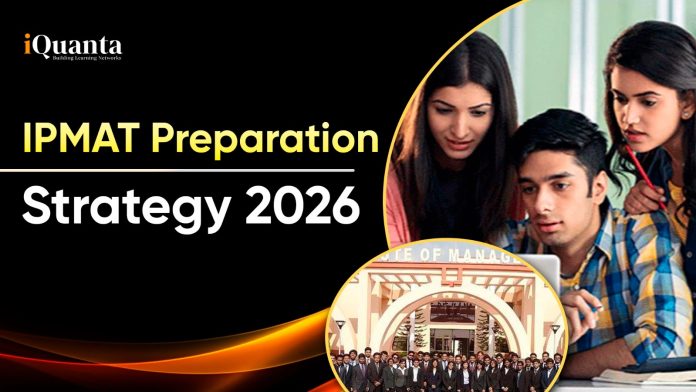IPMAT Preparation Strategy 2026: The IPMAT 2026 is a national-level entrance exam conducted by the Indian Institutes of Management (IIMs) for admission to their five-year integrated management programs. The exam, organized by IIM Indore and IIM Rohtak, is designed to select students who wish to pursue management studies right after their 12th grade.
IPMAT evaluates candidates on their quantitative ability, verbal ability, and logical reasoning skills. With the IPMAT 2026 being a highly competitive exam, it’s crucial for students to prepare strategically. A proper IPMAT Preparation Strategy 2026 helps in mastering key concepts, improving problem-solving speed, and building confidence.
A well-structured plan allows students to cover all the essential topics and perform well in the exam. Candidates can check the detailed IPMAT Preparation Strategy 2026 along with the best course for IPMAT 2026 Preparation, tips for droppers, and a timetable for effective preparation below.

IPMAT Preparation Strategy 2026
IPMAT Preparation Strategy 2026 is important to score well in the IPMAT 2026 exam. The exam is expected to be held in May 2026, and with 12 months left, students have enough time to prepare effectively. By starting early and preparing in a structured way, students can cover all topics and be ready for the exam.
An effective IPMAT Preparation Strategy 2026 helps students focus on important subjects, practice with mock tests, and manage their time better. This approach helps improve speed, accuracy, and problem-solving skills, which are key to doing well in the exam.
With the right strategy and best IPMAT Course 2026, students can reduce mistakes, build confidence, and approach the IPMAT 2026 exam with clarity. A well-planned preparation schedule will make it easier to cover all sections of the exam and increase the chances of success.
IPMAT Exam 2026 Overview
IPMAT 2026 is expected to follow a similar structure to previous editions. Among the various IPMAT exams, IPMAT Indore is considered the toughest due to the inclusion of Higher Mathematics and a challenging exam pattern.
Before starting your preparation, it’s essential to understand the detailed exam structure. Below is an overview of the expected IPMAT 2026 exam pattern for IPMAT Indore, IPMAT Rohtak, and JIPMAT, which will help you plan your study schedule efficiently.
| IPMAT Exam 2026 Overview | |||||
| Exam Type | Section | Number of Questions | Time Limit | Marks | Marking Scheme |
| IPMAT Indore | Quantitative Aptitude (SA) | 15 | 40 minutes | +4 for each correct answer, -1 for each incorrect answer, No negative marking for SA | |
| Quantitative Aptitude (MCQ) | 30 | 40 minutes | |||
| Verbal Ability | 45 | 40 minutes | |||
| Total | 90 | 120 minutes | 360 | ||
| IPMAT Rohtak | Quantitative Ability | 40 | 120 minutes | 160 | +4 for each correct answer, -1 for each incorrect answer |
| Logical Reasoning | 40 | 160 | |||
| Verbal Ability | 40 | 160 | |||
| Total | 120 | 480 | |||
| JIPMAT | Quantitative Aptitude | 33 | 150 minutes | 132 | +4 for each correct answer, -1 for each incorrect answer |
| Data Interpretation & Logical Reasoning | 33 | 132 | |||
| Verbal Ability & Reading Comprehension | 34 | 136 | |||
| Total | 100 | 400 | |||
Understanding these exam patterns will help students align their IPMAT 2026 preparation strategy with the structure of the exam. This ensures an effective and focused study plan leading up to the exam in May 2026.
IPMAT Preparation Strategy 2026- Step By Step Guide
IPMAT 2026 exam, which is conducted by multiple institutions like IIM Indore, IIM Rohtak, and JIPMAT. While the exam patterns of IPMAT Indore, IPMAT Rohtak, and JIPMAT may vary slightly, the core preparation strategy remains similar. A clear understanding of the exam pattern, a well-structured study plan, consistent practice through mock tests, and a focus on time management are essential elements of the IPMAT Preparation Strategy 2026.
Below is a comprehensive, step-by-step preparation guide that applies to all these exams, with specific pointers to cater to each exam’s requirements.
Step 1: Understand the Exam Pattern
Before starting your preparation, it is essential to have a clear understanding of the IPMAT 2026 exam pattern. While the sections and question types are largely similar, each exam may have its unique structure.
- IPMAT Indore: Focuses on Quantitative Aptitude (SA & MCQ), Verbal Ability, and Logical Reasoning. Higher Mathematics is a key challenge here.
- IPMAT Rohtak: Follows a similar pattern but has a more traditional approach with Quantitative Aptitude, Logical Reasoning, and Verbal Ability. There is no significant emphasis on higher-level mathematics.
- JIPMAT: Comprises Quantitative Aptitude, Data Interpretation and Logical Reasoning, and Verbal Ability & Reading Comprehension.
Marking Scheme for All:
- Correct Answer: +4 marks (for MCQs)
- Incorrect Answer: -1 mark (for MCQs)
- No Negative Marking: For Short Answer (SA) questions in IPMAT Indore

Step 2: Create a Study Plan
Creating a structured study plan is crucial to cover all the topics in time. You have about 12 months to prepare, which allows you to plan your preparation in phases:
- Phase 1 (3-4 months): Start by building foundational concepts. Focus on basic Mathematics, English, and Logical Reasoning. Work on clearing your doubts and understanding the core concepts.
- Phase 2 (3-4 months): Move on to advanced topics and take up mock tests. At this stage, time management becomes important. Work on speed and accuracy.
- Phase 3 (Last 2-3 months): Concentrate on revision, full-length mock tests, and solving previous year papers. This phase is crucial for fine-tuning your strategy.
Remember, this plan should be flexible. Adjust based on the exam you’re preparing for. For example, if you’re preparing for IPMAT Indore, more time may be spent on Higher Mathematics.
Step 3: Focus on Each Section
To do well in the IPMAT 2026 exams, it’s important to focus on each section carefully. Here’s a guide on how to prepare for the key sections:
Quantitative Aptitude:
- Start by learning important topics like Arithmetic, Number Systems, and Algebra. These are the core concepts for this section.
Once you’re comfortable with the basics, focus on Geometry, Trigonometry, and Calculus (if needed). Regular practice will help you get better. - Work on both Multiple Choice Questions (MCQs) and Short Answer (SA) questions to get used to different formats.
- Solve problems under time limits to increase your speed and reduce mistakes in the exam.
Logical Reasoning:
- Practice reasoning puzzles such as seating arrangements, blood relations, and syllogisms to improve your logical thinking.
- Focus on understanding tables, graphs, and charts, as they are an important part of logical reasoning in many exams.
- Work on solving puzzles and reasoning questions within a set time to improve your speed.
Verbal Ability:
- Develop your Reading Comprehension (RC) skills by reading newspapers, books, and articles. Practice answering questions based on what you read.
- Work on improving your grammar with exercises like sentence correction and build your vocabulary by learning new words daily.
- Regularly practice verbal reasoning exercises to improve your ability to answer questions quickly and accurately.
Step 4: Take Regular Mock Tests
Mock tests are one of the most effective tools to measure your preparation. For all three exams:
- Start with subject-wise mock tests to get an idea of your strengths and weaknesses.
- Gradually increase the difficulty level of the mock tests to match the exam conditions.
- In the last 2-3 months, switch to full-length mock tests. Take at least 1-2 mocks per week.
- Analyze each mock test thoroughly. Focus on your mistakes and correct them.
- For IPMAT Indore, make sure to practice both MCQ and Short Answer questions.
Step 5: Focus on Time Management
Time management is essential for success in IPMAT 2026. Here are a few time management tips:
- Know your strengths and divide time accordingly for each section. For example, if you’re stronger in Quantitative Aptitude, allocate more time to Verbal Ability.
- Practice with a timer while solving practice papers to improve your speed.
- Develop the habit of skipping questions that take too long to solve and coming back to them later.
- Each section has a time limit of 40 minutes (for IPMAT Indore). Practice completing each section within this time frame.
Step 6: Stay Consistent and Keep Reviewing
Consistency is key to succeeding in IPMAT 2026:
- Stick to your daily study schedule and make sure to review regularly.
- At the end of each week, revise what you’ve learned so far.
- Review your mistakes after each mock test and avoid repeating them.
- Don’t wait until the last minute to start revisions; a consistent approach yields better results.
Step 7: Stay Motivated and Positive
Maintaining a positive mindset and motivation is crucial for long-term preparation:
- Set small goals to track your progress, and celebrate each milestone.
- Take short breaks during study sessions to avoid burnout.
- Stay positive, and remember that consistent hard work will pay off in the end.
- If you’re feeling stressed, take some time to relax, meditate, or go for a walk.
No matter which exam you’re targeting, these tips will guide you through the preparation process. Stay disciplined, focused, and consistent in your approach, and you’ll be well on your way to cracking the IPMAT 2026! Best of luck!
IPMAT 2026 Course by iQuanta
Our IPMAT 2026 course provides you with all the resources and expert guidance needed to ace the exam. With live sessions, personalized mentorship, and extensive practice tests, you’ll be fully prepared for all sections of the exam. We also offer a 24×7 doubt-solving facility to ensure that you never feel stuck during your preparation.
The course comes with special modules tailored for students who need extra help with Quantitative Aptitude, especially for those weak in the subject. This course is an investment in your future and an excellent opportunity to join India’s top B-schools.
IPMAT 2026 Preparation Tips For Droppers
If you’re a dropper preparing for IPMAT 2026, it’s important to approach your preparation with a focused and strategic mindset. The following are tips to help you succeed:
- Review Past Mistakes: Reflect on the areas where you struggled in your previous attempt. Identify weak subjects and focus on improving them.
- Create a Timetable: Set a daily study routine that balances all sections of the exam. Prioritize difficult topics but also make time for regular revision.
- Focus on Concept Clarity: Ensure that your basic concepts are strong, especially in Quantitative Aptitude and Logical Reasoning. A solid foundation will help you tackle more complex problems.
- Practice Regularly: Solve previous year papers and take mock tests regularly to improve your speed, accuracy, and time management.
- Stay Motivated: Dropping a year can be challenging, so stay positive and motivated. Keep your goal in mind and remind yourself why you’re working hard.
IPMAT 2026 Exam Timetable for Preparation
Creating a study timetable is essential to ensure you cover all topics and stay on track for the IPMAT 2026 exam. This study plan is flexible, so you can adjust it according to your strengths and weaknesses. It includes all key sections to help you build a strong foundation, practice regularly, and improve exam strategies.
| IPMAT 2026 Exam Timetable for Preparation | ||
| Time Slot | Activity | Duration |
| 6:00 AM – 7:00 AM | Morning Review – Quickly review what you studied the day before and focus on your weak areas. | 1 hour |
| 7:00 AM – 8:30 AM | Quantitative Aptitude (QA) – Focus on important topics like Arithmetic, Algebra, and Advanced Math. | 1.5 hours |
| 8:30 AM – 9:00 AM | Break – Take a short break, have breakfast, and recharge. | 30 minutes |
| 9:00 AM – 10:30 AM | Logical Reasoning (LR) – Practice different puzzles, seating arrangements, and data interpretation. | 1.5 hours |
| 10:30 AM – 12:00 PM | Verbal Ability (VA) – Work on reading comprehension, vocabulary, sentence correction, and grammar. | 1.5 hours |
| 12:00 PM – 1:00 PM | Lunch Break – Take a break, relax, and have lunch. | 1 hour |
| 1:00 PM – 2:30 PM | Quantitative Aptitude (QA) – Solve MCQs and practice previous year’s questions to strengthen skills. | 1.5 hours |
| 2:30 PM – 4:00 PM | Logical Reasoning (LR) – Focus on data interpretation and practice reasoning under timed conditions. | 1.5 hours |
| 4:00 PM – 4:30 PM | Break – Take a short break, relax, or take a walk. | 30 minutes |
| 4:30 PM – 6:00 PM | Verbal Ability (VA) – Continue practicing grammar, vocabulary, and reading comprehension exercises. | 1.5 hours |
| 6:00 PM – 7:00 PM | Mock Test / Practice – Take a section-wise mock test or solve practice papers for Quant, LR, or VA. | 1 hour |
| 7:00 PM – 8:00 PM | Dinner Break – Relax and have dinner. | 1 hour |
| 8:00 PM – 9:00 PM | Review & Analysis – Go over your mock test results, analyze mistakes, and track your progress. | 1 hour |
| 9:00 PM – 9:30 PM | Break / Relaxation – Take a short break to relax before bed. | 30 minutes |
| 9:30 PM – 10:00 PM | Light Revision – Quickly review formulas, vocabulary, or practice a short reading comprehension. | 30 minutes |
Enroll for iQuanta IPMAT Course

IPMAT Preparation Strategy 2026 FAQs
IPMAT preparation strategy involves understanding the exam pattern, creating a clear study plan, practicing regularly with mock tests, and focusing on time management for each section. Consistency and revision are essential for success.
If you are a dropper, focus on reviewing past mistakes, strengthening weak areas, and building a solid foundation in Quantitative Aptitude and Logical Reasoning. Create a structured timetable, practice regularly, and take mock tests to improve your performance.
A good IPMAT preparation timetable includes early morning reviews, focused study sessions on Quantitative Aptitude, Logical Reasoning, and Verbal Ability, along with regular breaks. Aim for 7-8 hours of study each day and include mock tests and revision in the evening.
IPMAT preparation course should provide expert guidance, personalized mentorship, live study sessions, and a lot of practice tests. iQuanta’s IPMAT course offers tailored modules and 24×7 doubt-solving support, which is great for thorough preparation.
To improve speed and accuracy, practice solving questions under timed conditions. Regularly take mock tests, identify your weak areas, and work on quick problem-solving techniques for all sections of the exam.




